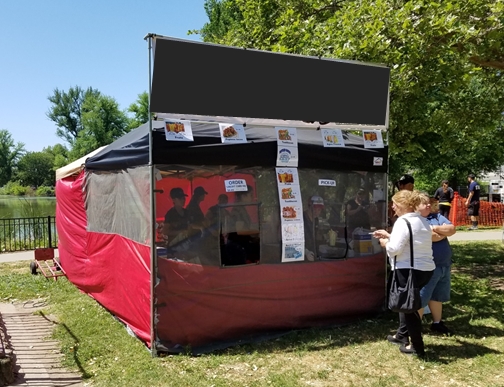
"Community Event” is defined in the California Health and Safety Code section 113755 as an event that is of civic, political, or educational nature, including state and county fairs, city festivals, circuses and other public gathering events approved by the local enforcement agency.
Vendors selling food at community events are required to have a health permit. In most cases, permits are obtained by the event organizer.
If you are interested in selling food at an event, start by contacting the event organizer, they are required to provide permit information to all vendors, obtain information/menu sheets for each vendor and submit an application package to EMD at least two weeks prior to the event.
Please contact EMD with any additional questions at (916) 875-8440.
To apply for a permit or find out more information, please contact EMD at (916) 875-8440.
The Community Event Organizer packet has information and forms to complete for the person who is coordinating all the Temporary Food Facilities (food booths and beverage booths). Community Event Forms and Documents.
The Temporary Food Facility Operator Packet is required reading for each person operating a food booth as well as the organizer. This packet has forms to complete as well as listing the requirements for the food booth to be approved to operate.
In some cases, a Temporary Food Facility Operator will participate in several events within Sacramento County during a single year. In this case, an operator may consider obtaining a Multi-Event Permit.
Seasonal Operations
In some cases a seasonal operation may be approved. The seasonal operation will be designated as High Risk or Low Risk depending on the facilities and scope of food sales. All Seasonal Temporary Food Facilities must complete and follow the instructions in the Multi-Event Vendor Packet:
Criteria for the designation of Season Operation include, but are not limited to;
- Low Risk designation includes: properly labeled, prepackaged, processed food from an approved facility that may or may not require refrigeration such as candy, canned soda, and ice cream bars. Unpackaged potentially hazardous foods that require no preparation other than portioning and serving such as pizza, hot dogs or ice cream. Unpackaged non-potentially hazardous foods such as popcorn, snowcones, and cotton candy.
- High Risk designation includes: Assembling, prepping, or cooking of potentially hazardous foods such as BBQ chicken, tacos, sushi, chow mein, hamburgers etc.
Operation should not exceed 25 consecutive or non-consecutive days in a 90 day period. The “seasonal” designation would be used in cases where the same seasonal activity occurs year after year. Examples: little league snack bars, Christmas tree lots, pumpkin patches.
If a seasonal snack bar is operating for more than 25 days in a 90 day period, it is required to have permanent approved facilities.
Workshop Presentation and Outreach:
Temporary Food Facilities (TFF) or food booths are food operations that operator at approved public events. Environmental Health hosted free workshops. Topics included the application process, food booth set-up requirements, temperature control, personal hygiene, food contamination and food sanitation. Temporary Food Facility Workshop PowerPoint 5/22/24
